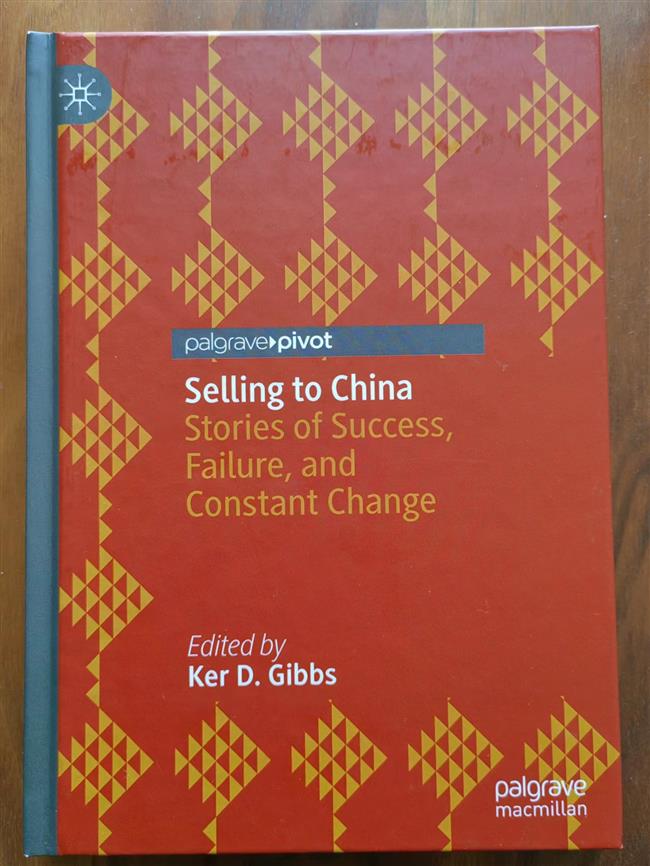Down-to-earth advice from American businesspeople in China
"Selling to China: Stories of Success, Failure, and Constant Change" is an collection of articles by veteran businesspeople from select industries who have spent decades conducting business here and understanding China, in their efforts to make a case for trade.
Their nuanced narrative, aided by their unique knowledge base and perspective, should afford politicians and the general public in the United States valuable insight into the importance of relations between the two countries.
As Ker D. Gibbs, the editor, observes in the introduction: "The relationship between the United States and China has often been called the most consequential bilateral relationship on earth, but it also may be the most fraught with conflict and misunderstanding." Gibbs is the immediate past president of the American Chamber of Commerce in Shanghai, where he focused on US-China relations and business issues facing American companies operating in Asia.

The changing relations, he writes, leave companies "stuck in the middle."
It's natural that businesspeople here want to have their voices heard, and such organizations as AmCham are playing an active role helping companies "sort through these and other challenges," given the organization's role in helping CEOs, entrepreneurs, lawyers and bankers come together to exchange information and express views.
During their annual trip to Washington DC, known as the "Doorknock," these business leaders who work and live in China seek to meet members of Congress and administration officials. As a matter of fact, several authors in this book have served as members of this delegation and share in the book what they have learned from the meetings.
The American business community in China, as joint stakeholders, have reasons to be concerned about the current state of mutual relations that, if mismanaged, might "wipe out decades of investment and hard work and deny future opportunities for job growth and value creation."
Gibbs is right in stressing the public need to have "a full set of facts and a complete picture, especially on issues as complicated and consequential" as the commercial side of China-US relations, which he characterizes as "an important and stabilizing influence."
As the articles are all written by substantial enterprises operating locally and committed to the local market, their minute descriptions of their modus operandi in their own sector have a unique value not only for policymakers, but also for the public in general, and for businesspeople interested in China in particular.
Even Chinese readers stand to profit from this collection of articles, for these authors enjoy the clairvoyance of being an insider, without losing their detachment as an outsider.
For instance, the book summarizes the history of foreign investment in China succinctly.
In the 1980s and early 1990s, most foreign companies were "forced" to form joint ventures with local firms, as elaborated by Daniel Krassenstein in his chapter on supply chains.
In the late 1990s and 2000s, as Chinese incomes went up, foreign firms began to view China as a key market, and they began serving China's consumer needs as well as those of industry. This gave rise to the slightly ambiguous term "in China for China," in lieu of "made in China." The new wording emphasizes a long-term commitment to China as a market rather than a mere source of cheap labor for manufactured exports.
Unfortunately, as China-US relations deteriorated, people in Washington began to read something suspicious into the term that seemed to question the loyalty of American firms, with some politicians deliberately playing up the issue as a way to rouse voters.
Several of the authors in the book explain why this rhetoric goes against American interests in the long term.
Foreign business continue to adapt to local conditions.
As the domestic market has become more sophisticated, consumer tastes turn local, with the capabilities of local firms dramatically increased, giving more weight to the home court advantage. Some foreign businesses have settled for minority equity stakes in their would-be competitors, while others have chosen local partners, giving rise to "in China with China" or, as most foreign companies would characterize themselves, "in China selling to China."
Nothing illustrates this better than the automotive industry, as elaborated by industry expert Bill Russo in his article "China's Auto Industry: The Race to a Sustainable Future." As China becomes the world's largest auto market, the significant innovation taking place here made China a leader in NEVs.
Notwithstanding the paradigm shift, no astute businesspeople could afford to underestimate the critical importance of China, whether as a manufacturing base or a market.
As cited in "Legal Services: Lessons of a Technology Lawyer in China" by Don S. Williams and Marie C. Williams, Tim Cook, CEO of Apple, claimed: "Our view is that China will be Apple's top market in the world – and not just for sales. It's also the developer community, which is growing faster than any other country in the world. The ecosystem there is very, very strong."
Apparently the benefits of a harmonious and cooperative relationship go well beyond business.
"For the past four decades, the United States and China have lived in relative peace. This peace has enabled and nurtured a commercial relationship that has made both countries more prosperous than they would have been on their own. It is undoubtedly desirable – and still possible – for the two countries to find a path forward that each can comfortably live with," as Gibbs concludes in the book.















